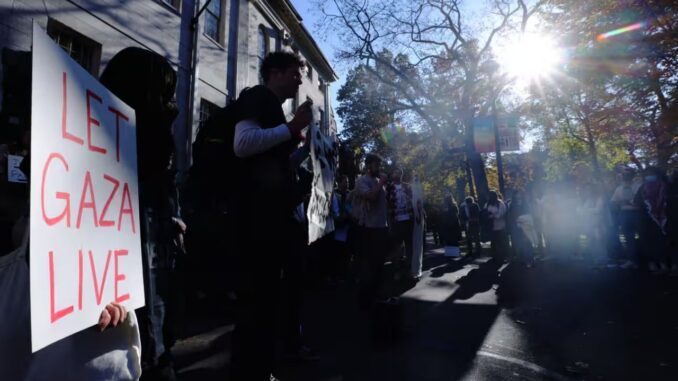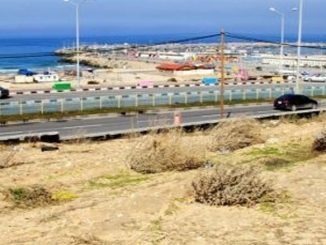
The “Harvard Law Review” has declined an essay by Palestinian doctoral candidate Rabea Eghbariah after it had been initially approved.
A prestigious journal published by Harvard Law School has been accused of censorship after it refused to publish an academic article accusing Israel of committing genocide in Gaza, allegedly because editors feared a backlash.
The Harvard Law Review, which is run by the school’s student body, declined the 2,000-word essay – titled The Ongoing Nakba: Towards a Legal Framework for Palestine – by a Palestinian doctoral candidate, Rabea Eghbariah, after it had been edited, fact-checked and initially approved.
The article, commissioned after Hamas’s 7 October attack on Israel, followed by an Israeli assault on Gaza, would have been the first by a Palestinian scholar ever published by the review. The Intercept originally broke the story.
It argued that events in Gaza – where more than 14,000 Palestinians have been killed since Israel launched its military offensive – met the terms of genocide as defined by the United Nations convention. The article also called for a legally recognised crime of “Nakba” (catastrophe), the Arab word used to describe the forced removal of Palestinians from their homes at the time of Israel’s founding in 1948.
But plans to publish it as a blogpost were abandoned after a crisis meeting of more than 100 editors. The rejection was reportedly driven by fears that publication might harm editors’ career prospects by provoking a backlash that could include having their personal details disclosed in an attempt at public shaming, a process known as “doxxing.”
Working on the review is a well-trodden path for law school students, who later advance to high-flying careers in politics, elite law firms, and clerkships at the US supreme court. Barack Obama served as the review’s president during his time as a Harvard law student.
The decision was criticized in a statement issued by 25 editors, who said such a rejection was unprecedented and motivated by fear.
“At a time when the Law Review was facing a public intimidation and harassment campaign, the journal’s leadership intervened to stop publication,” they wrote, according to the Intercept. “The body of editors – none of whom are Palestinian – voted to sustain that decision. We are unaware of any other solicited piece that has been revoked by the Law Review in this way.”
The review’s editor, Apsara Iyer, told Eghbariah, in an email that the decision “was not based on your identity or viewpoint”.
However, a separate email written by an online editor, Tascha Shahriari-Parsa, and reported by the Nation suggested otherwise.
“The discussion did not involve any substantive or technical aspects of your piece,” Shahriari-Parsa told Eghbariah. “Rather, [it] revolved around concerns about editors who might oppose or be offended by the piece, as well as concerns that the piece might provoke a reaction from members of the public who might in turn harass, dox or otherwise attempt to intimidate our editors, staff and HLR leadership.”
In response, Eghabriah, a human rights attorney, complained to editors that the decision amounted to “discrimination” and “outright censorship”.
The article was eventually published by the Nation under the headline The Harvard Law Review Refused to Run This Piece About Genocide in Gaza.
In it, Eghbariah cites several scholars who argue that Israeli actions meet legal criteria for genocide, before adding: “And yet, leading law schools and legal scholars in the United States still fashion their silence as impartiality and their denial as nuance.
“Palestine is where genocide can be performed as a fight of ‘the civilised world’ against the ‘enemies of civilization’ itself. When contrasted with Jewish-Israeli life – the ultimate victims of European genocidal ideologies – Palestinians stand no chance at humanisation.”
Noting that genocide was enshrined into the UN charter and international law due to the crimes of the Holocaust, he envisions a similar legally defined outcome for Palestinian experiences. “We must imagine that one day there will be a recognised crime of committing a Nakba, and a disapprobation of Zionism as an ideology based on racial elimination,” he concludes.
The controversy over the article follows a series of rows that have engulfed Harvard and other universities in the wake of Hamas’s assault, which led to the killing of 1,200 people and the kidnapping of around 240 others.
Larry Summers, a former Harvard president and US treasury secretary, denounced the university for failing to condemn an open letter left by a pro-Palestinian student group in the campus’s main courtyard in the immediate aftermath of the atrocities that put the blame on Israel.
“In nearly 50 years of @Harvard affiliation, I have never been as disillusioned and alienated as I am today,” he tweeted. He said the letter and university officials’ failure to condemn it “allowed Harvard to appear at best neutral towards acts of terror against the Jewish state of Israel”.
His criticism prompted the current Harvard president, Claudine Gay, to publicly condemn Hamas’s “barbaric atrocities”. But she rejected calls to name and punish students who signed the open letter, saying the university “embraces a commitment to free expression”.



